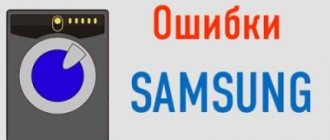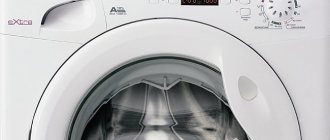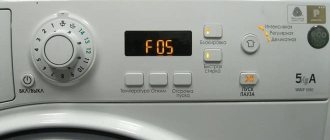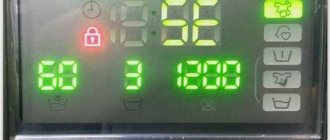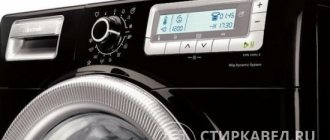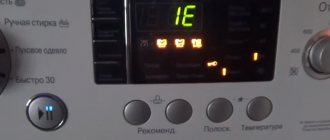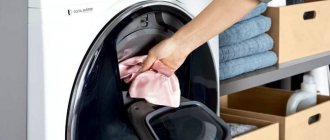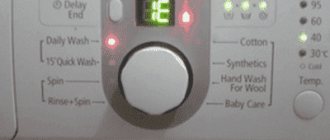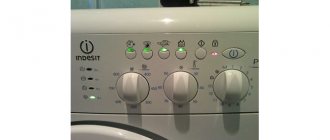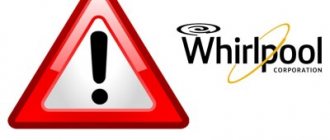Most models of household washing equipment from the Swedish concern have displays that display the current state of the unit. This convenience allows you to equip automatic washing machines (hereinafter also referred to as SMA, SM) with additional service capabilities. In case of malfunctions, error codes of Electrolux washing machines are displayed on the display screens. They allow owners to localize the breakdown and, in some cases, fix it themselves or report the code to the service center. Then it will be easier for the technician to figure out which unit might have failed.
The error code displayed on the display allows you to localize the fault and speed up repairs
The Electrolux group of companies produces washing equipment under three brands, which also include the well-known brands Zanussi and AEG. To optimize the production process, most parts in these units are identical. The fault codes are also the same. Error codes for Electrolux washing machines are alphanumeric combinations starting with a letter of the Latin alphabet. Almost all of them have the letter E at the beginning (from the English error - error). Let's look at typical faults and their codes.
Failures associated with water entering the drum
Problems in the operation of units associated with the lack of water in the tank are common among Electrolux models - for example, such as the W4180H. Given that the quality of tap water leaves much to be desired, large amounts of sediment can often be observed deposited in hoses, filters and drain pumps. This makes it difficult or stops transporting water into or out of the tank.
Error E10 in Electrolux washing machines is one of the most common
Error E10 in Electrolux washing machines, as well as E11 in some models, indicates that there are certain problems with the intake of liquid into the drum: water does not flow or its pressure is so low that the level does not reach the optimal level in the allotted time.
First, the most obvious causes of the error are checked - maybe there is simply no water in the water supply.
During diagnostics, the pressure in the inlet line through which the liquid flows is checked. Often the water in our houses is turned off or the owners turn it off themselves and then forget to turn it on. Therefore, such reasons are quite common. In addition, the inlet hose and filter are checked for clogging.
The intake valve may not open due to the lack of a control signal or due to a broken winding in the electromagnet (possible error EC1 ). You can check the winding with a multimeter - if it is working properly, the device should show a resistance in the range of 3.6–3.8 kOhm. The electronic control unit (hereinafter also referred to as ECU) contains symmetrical thyristors - triacs (hereinafter also referred to as triacs) that control the valves. If there is a malfunction in this unit, water will not flow into the tank.
All of the above breakdowns can be eliminated by cleaning the intake manifold and clogged parts or replacing faulty elements.
Problems draining liquid from the tank
If error E20 on an Electrolux washing machine, this means that water has not been removed from the SM within a time period of 10 minutes or more. A breakdown can be indicated by codes E21 , C2 , E23 , EF0 and E24 .
EF1 may indicate that the drain time has been exceeded . EF2 combination indicates an increased level of foaming, which may also be due to a clogged drain line. Error EF3 indicates a leak in the pump or damage to its wiring, leading to the activation of the Aquastop system.
First of all, the problem should be looked for in the sewer and drain hose - they may be clogged. In addition, you should check the filter located in front of the drain pump; there may also be a blockage there.
You can check and clean the drain filter in your washing machine yourself.
The cause may also be a malfunction:
- drain pump - error E85 ;
- triac that controls the operation of the pump - codes E23 and E24 ;
- other elements of the electronic control unit.
The resistance of the winding that drives the pump should be around 200 Ohms. If its value is very different, the pump will have to be replaced.
Malfunctions related to the pressure switch
This device is also called a water level sensor or pressure sensor. The overall performance of the SMA depends on its proper operation. For example, if the sensor is faulty, the laundry spin mode may not turn on or the washing mode may start prematurely.
If the pressure switch is not working properly, you can clean the tube or replace the sensor yourself
Code E30 informs that the sensor is not configured correctly and reports an incorrect amount of liquid poured into the tank. The main reasons for such failures are:
- clogging of the tube through which the pressure created by the flooded water in the tank is supplied;
- setup failure;
- failure.
Another possible reason is unstable mains voltage.
Inconsistency between the operation of the water level sensor and the relay that controls the operation of the heating element - heating element - is expressed by the appearance of code E33 . The best solution to the above problems is to install a mains voltage stabilizer, clean the tube or replace the sensor.
Error E31 informs you that the sensor is not working. A faulty part is also one of the reasons for error E32 . You can check the pressure switch yourself. To do this, you need to connect another tube of the same diameter to it and blow strongly into it several times. If you hear clicks at this time, it means that the device may be working properly and the problem lies not in it, but in the wiring to the control unit. A more correct diagnosis is to check the resistance of the pressure switch winding while air is blown into it. If at the specified moment the resistance level does not change, the sensor must be replaced.
Similar checks should be carried out when code E35 , which informs that the amount of liquid in the tank is exceeded. This means that the operation of the water level sensor is disrupted and it did not send a signal to turn off its supply. Error E38 signals the absence of information coming from the sensor to the ECU, and also requires checking the connecting circuits.
The triac controlling the UBL burnt out
The second possible reason for error E41 is a burnt triac or faulty control board. That is, the UBL works normally, but the system does not receive a signal that a blockage has occurred. To repair a damaged module, the circuit will have to be removed and inspected . To do this you need:
When removing the control board from the Electrolux washing machine, you should secure all the disconnected wires to the camera so as not to mix up the connections during reassembly.
As soon as the board is in your hands, you should carefully inspect its surface for defects, traces of burning or mechanical damage. If there are no visible reasons for concern, you will have to again resort to using a multimeter and check each triac for breakdown. The following instructions will help you understand what to do to check the module.
But it’s better not to experiment with the board and entrust the solution to the problem with error E41 to the service center technicians. Remember that the module is a fragile and expensive thing, so without experience and practice it is easy to aggravate the breakdown.
Source
Problems with the operation of the hatch covering the tank
Such breakdowns are among the most common. Error E40 in an Electrolux washing machine provides information that the door is not closed. E41 also informs about this . The door may be ajar for the following reasons:
- not pressed enough when closing;
- the lock blocking the hatch is faulty ( E42) ;
- there are problems with the locking system;
- laundry got into the gap between the tank and the door;
- The rubber gasket sealing the hatch is damaged or deformed.
Malfunctions associated with malfunction of the hatch door are unlikely to be resolved independently
Code E43 indicates that a breakdown of the triac that controls the operation of the lock has been detected. E45 combination indicates that the fault lies in the electronic parts and circuits that control the operation of the triac and lock. The causes of these problems are located in the control unit, as well as in the connecting wires and connectors. Coding E44 informs about a malfunction of the sunroof closing sensor. This can be “cured” by checking the connecting circuits and replacing the faulty part.
Error code E40 indicates a malfunction related to the lack of fixation of the hatch door
Common Mistakes
Washing machines of the Electrolux, Zanussi and AEG brands are manufactured by the same company and are equipped with the same control modules, so the error codes do not differ. There are quite a large number of information codes, so it is convenient to combine them into groups depending on the types of failure.
Before you begin inspection and troubleshooting yourself, you need to read the operating instructions for the equipment.
Error codes related to water inflow and drainage
Information codes E10 and E11 mean that no water is flowing into the washing machine, or the time allotted by the program to fill the tank has been exceeded. The simplest reasons for such errors may be turning off the water in the house or accidentally closing the tap supplying water to the installation.
If, after checking the water pressure, the machine still cannot start washing, you should inspect the inlet hose and the filter located at the point where the hose is attached to the washing machine, and remove any blockages. The hose may become bent, then it should be straightened.
If there are problems with the water supply, first of all you need to check the serviceability of the corresponding hose
If the washing machine fills with water and immediately drains it, the problem may be that it is not connected to the drain properly. The place where the drain hose connects to the sewer must be higher than the washing machine tank, otherwise spontaneous draining will occur.
More serious malfunctions that will require calling a specialist are malfunctions of the fill valve (it may be stuck in the closed position, which is also indicated by error code EC1 ) or malfunctions of the control module.
The unit displays code E13 when water leaks into the washing machine tray. The cause of the problem may be depressurization of hoses and their connections, or damage to the integrity of the tank.
Error codes E20 , E21 and EF0 , EF1 indicate problems in draining water from the washing machine. The causes of the malfunction may be:
- clog in the drain hose, filter protecting the pump, or in the sewer;
- drain pump malfunction;
- malfunction of the control module.
First of all, check the drain hose and filter for blockages. The hose is disconnected from the washing machine and pipe, washed with running water or cleaned with a special cable. The filter is also easy to check yourself - it is usually hidden behind a door located at the bottom of the front panel of the washing machine. Sometimes drainage is difficult due to blockages in the drain. A sign of blocked pipes will be slow flow of water from the sink or bathtub.
To clean the drain filter, you need to open the door located at the bottom of the front panel of the washing machine.
If after these manipulations the error does not disappear, you need to call a specialist to inspect the drain pump and check the control module.
Information codes E23 and E24 indicate a malfunction of the triac that controls the drain pump, or a failure of contacts between the triac and the pump. In both cases, the water will not drain.
Error codes associated with malfunctions of the pressure switch (water level sensor)
A pressure switch is a sensor that determines the water level in the tank of a washing machine; malfunctions in its operation are indicated by information codes E31 , E32 , E33 , E34 .
The reasons for the incorrect operation of the sensor may be clogging of its tube, disruption of contacts and communication with the control module. In rare cases, the occurrence of an error is associated with a clogged water inlet system. Error E33 may occur due to unstable voltage in the network and disappears only after it has stabilized.
You can check the serviceability of the wiring and pressure switch hose yourself
You can eliminate the error yourself by cleaning the pressure switch tube and checking its contacts. The sensor is usually located in the right corner under the lid of the washing machine. It is better to entrust the repair of other faults to professionals.
Error codes related to engine problems
There are quite a lot of variants of malfunctions that can occur in engine operation, as well as the codes indicating them. Errors E50 , E51 , E53 , E54 , E55 indicate disturbances in the operation of the motor itself, its winding, the seven-stor, or the circuit connecting the motor and the seven-stor.
A separate group includes information codes E52 , E56 , E59 , which indicate malfunctions of the tachogenerator - a sensor installed on the motor and monitoring its rotation speed.
The tachometer controls the speed of the electric motor.
Errors E57 and E58 indicate increased voltage levels in the network, which in turn may lead to the need to replace the washing machine motor, control module or wiring.
It is better to entrust troubleshooting related to engine operation to a specialist.
Error codes related to water heating
This group of information codes includes E61 , E62 , E66 , E68 , E69 , E3A , E71 , E74 . The washing machine cannot heat the water to the required temperature; it does it too quickly or, conversely, slowly. Since a heating element (tubular electric heater) and a temperature sensor are responsible for heating the water in the installation, the causes of errors will be associated with malfunctions in the operation of these parts, for example:
- failure of the heating element, its relay or contacts;
- breakdown of the sensor, its contacts, failure of communication with the control module.
In case of these malfunctions, you can try to check the contacts and resistance of the devices yourself. It is better to entrust repair and replacement of the sensor and heating element to specialists.
The heating element of a washing machine often fails due to the formation of limescale on its tube
Most often, the heating element of a washing machine overheats and fails due to scale that settles on its tube. To prevent the formation of plaque, you can periodically clean the washing machine, for example, with citric acid, or use water softening agents.
Error codes related to the operation of the hatch door
If the wash is started with the hatch door closed incorrectly, one of the following information codes will appear on the screen: E40 , E41 , E42 , E43 , E44 , E45, and the installation will stop working.
There can be several reasons for errors:
- door not closing tightly;
- foreign objects getting into the hatch or locking mechanism;
- deformation of the rubber cuff;
- malfunctions in the hatch locking system or control board;
- breakdown of the lock mechanism.
It should be remembered that under no circumstances should you close the car hatch using force. This may cause the door to jam, making it much more difficult to repair. If the hatch does not close, you need to check whether the laundry in the drum is interfering with it, or whether there are foreign objects under the rubber cuff or in the lock slot.
Repairing the washing machine door lock is best left to professionals.
Other manipulations, such as replacing the rubber cuff, checking the wiring of the lock mechanism or replacing it, diagnosing the locking system and control module, should be performed by professionals.
Other error codes
Error codes E90 and E91 indicate a breakdown in communication between the control module and the washing machine panel. In case of such malfunctions, the installation does not respond to button commands. To “remove” the error, you can try to reboot the machine. In case of failure, you need to contact the service department.
Information code EF5 means load imbalance when spinning the washing machine drum. Usually the problem occurs during the rinsing or spinning stage. The machine stops working and water often remains in the tank. The causes of the malfunction are usually:
- too much or too little laundry loaded into the drum;
- washing very large and very small items at the same time, which leads to them twisting;
- The machine is installed on an uneven surface.
In order to properly distribute the laundry inside the drum, open the hatch of the washing machine, after draining the remaining water in the tank through the emergency pipe or drain hose. If the machine is not positioned correctly, it is moved to a flat horizontal surface.
Information code EF2 indicates excessive foaming in the drum. The washing machine itself clears the error after the foam decreases in volume. If this does not happen for a long time, you need to drain the foam and water from the tank, remove the laundry and thoroughly wipe the drum and detergent compartment, removing any remaining powder. After cleaning is completed, you can start washing.
If you use too much powder when washing, foam will flow out of the machine.
Problems related to the operation of the electric motor
The electric motor that rotates the drum is the most important component of the washing machine, so any malfunction is critical and will affect the performance of the washing machine.
Error E50 informs about a whole range of possible problems associated with engine malfunction. These include:
- breakdown of the triac that controls the engine;
- incorrect operation of the tachogenerator, which provides information about the engine speed;
- malfunction of the control controller in the ECU;
- malfunction of engine bearings.
It is better to entrust diagnostics of the electric motor and its control circuits to qualified technicians
Code E51 specifies the breakdown, indicating a non-working triac. E53 signals an open circuit between the triac and the electric motor. The combination E55 lets you know that there is an open circuit in the motor circuit. E52 , E56 and E59 washing machines indicate the absence of signals that the tachogenerator should send. The reasons may vary. In the first case, the fixation of the Hall sensor washer is broken: most likely, it has jumped out of place. Other options are a malfunction of the tachometer, connecting electrical circuits and control board.
E54 signal suggests that one of the relays that controls the reverse rotation of the engine is not working - it is stuck or the control circuits are faulty. E57 signals that the permissible current consumed by the washing machine has been exceeded. The cause may be a short circuit in the motor winding or in the electrical wiring of the MCA. The above short circuit in the engine, as well as a malfunction in the ECU, can lead to the appearance of error code E58 .
Operating errors associated with the heating element (heater)
The heating element is one of the main parts in a washing machine. It often breaks down or works incorrectly. One of the common reasons is the formation of scale on pipes due to the high content of calcium and magnesium salts in the water.
In the photo you can see scale on the heater, formed due to too hard water
If the heater does not heat the water well, the SM lets you know about this with code E60 or E61 (in some models these errors can only be seen in test mode; they may not be displayed during operation). The reason is scale formation or a malfunction of the heating element. It can be checked with a multimeter - in working condition, the resistance of the heating coil is in the range of 30–40 Ohms.
Error E62 informs you that the water is heating too quickly and too much. The probable cause is a malfunction of the temperature sensor, which will need to be replaced. Codes E66 and E3A warn that the relay that controls the operation of the heating element is not working. In addition to a faulty relay, the problem may be in the control circuits. Combination E68 reports high leakage current. The cause may be a faulty heating element or ECU.
Code E36 signals a failure of the protective relay that prevents the heater from turning on in the absence of water. Codes E70 , E71 and E74 are related to the temperature sensor (NTC) not working properly. Error E70 signals an open circuit in the sensor circuit, E71 indicates that the NTC is not working properly and needs to be replaced. The appearance of the inscription E74 indicates that the position of the sensor has been violated and it is necessary to return it to its seat.
Conclusion
Electrolux washing machines have a fairly wide range of different problems. It’s just that washing equipment contains a very large number of elements, which means a large number of possible breakdowns. The manufacturer tried to provide for everything, so most of the codes exist only on paper. Most often in washing machines, the heating element or electric motor of the washing machine fails. You can repair these elements yourself at home.
With some skills, you can also replace or check the sensors. But in matters related to the electrical board, relays or checking electrical connections, it is better to contact a professional. Even experienced repairmen often give in to problems with the control circuit, and an attempt to solve the problem on their own can lead to complete breakdown of the machine. Well, or to a state when it will be cheaper to buy a new washing machine than to repair an old one. In any case, the final decision is up to the owner of the unit.
Codes of other breakdowns of Electrolux CM and their interpretation
Below is a table that reflects other error codes for Electrolux washing machines - combinations of letters and numbers displayed on the display and indicating certain breakdowns that may occur during operation.
| Fault code | Brief description of the breakdown | Diagnostics of parts, components and systems |
| E13 | The tightness of one of the units is broken, water got into the AGR pan | Determining and eliminating the causes of fluid leaks |
| E5A–E5F | The fault is related to the control electronics | Checking and replacing the ECU and display control board. Diagnostics of connecting cables and connectors |
| E82 | Error in the program selector | Checking and replacing the computer and program switch |
| E83 | The computer does not recognize the program selected by the selector | Diagnostics and replacement of the ECU |
| E90–E92 | The connection between the instrument panel and the control board is broken | Checking cables and connectors, eliminating breaks |
| E94, E95 | The selected program does not work correctly | Failure or malfunction of the flash memory in the control unit, check the connection contacts between the memory and other elements of the computer |
| E96–E99 | Malfunctions related to the control unit | Diagnostics and replacement of the ECU |
| EA1–EA6 | DSP-related malfunctions | Checking the engine and its drive belt, as well as the control unit |
| EB0–EB3, EH1–EH3 | Failures are related to the voltage level and frequency in the electrical network | Diagnostics and testing of 220 V network |
| EF4 | Inlet valves work, but the sensor reports no water | Checking the presence of water in the water supply |
| EF5 | The balance in the drum is disturbed, the spin program is stopped | Checking the position of the laundry and its uniform distribution in the drum |
Error indication in washing machines without display
Not all SMAs have displays that can visually display the status of their operation. There are models in which error codes for Electrolux washing machines are displayed by flashing certain indicators. SM of this type have two most common control modules - EWM 1000 and EWM 2000. Each of these modules generates faults in the same way, but they can be indicated differently.
The EWM 1000 module generates codes more easily. To view them, you need to press and hold two buttons in this state: “Start/Pause” and the additional function that is closest to the “Start/Pause” button for several seconds.
The EWM 1000 module usually has horizontal button layout
This operation can be carried out even during washing. First, the indicators located next to the pressed buttons will go out and then begin to flash according to the error code. The latest error code can be seen at any time if you move the selector to position 10 (diagnostic mode). The memory remembers this state of the SM.
The letter E is not displayed by indicators, since it is present in all combinations. Other letters, if present in the code, are displayed with flashes corresponding to the hexadecimal code:
- A – 10 blinks;
- B – 11;
- C – 12;
- D – 13;
- E – 14;
- F – 15.
The numbers are indicated by the number of light pulses from 0 to 9. If the code corresponds to, for example, EF5, this means that the first indicator will flash 15 times, and the second - 5.
Depending on the model, the EWM 2000 control modules have different designs, but the indication in them also corresponds to a hexadecimal code, the value of which is determined by the lit indicators in a group of four LEDs.
The indicators are arranged in order, from bottom to top, according to the table
How to read a signal
It just seems like a simple task. What’s so difficult, I looked at the display, checked the article, identified the error and corrected it. But it's not that simple. Firstly, there are both display and non-display options for controlling the Electrolux washing machine. And if the display panel simply displays an existing error code, then you will have to tinker with the option without a display.
If the Electrolux washing machine has an EWM 1000+ electrical board, then there are two options: the buttons are arranged vertically in one row or horizontally in two rows. For the first case, you need to press the two buttons closest to the selector and turn the selector by numbers from 1 to 8. Each number will mean its own block of errors, and the number of “blinks” of the LED will show the sub-number of the Electrolux error. Everything seems simple.
With two rows it is even more difficult; here, to enter the testing mode, you will have to hold the two upper plugs in the row farthest from the selector and also turn the knob for washing modes from 1 to 8. For Electrolux machines with the EWM 2000 system, the scheme is even more complicated and can be done without consulting a specialist It's unlikely to work.
